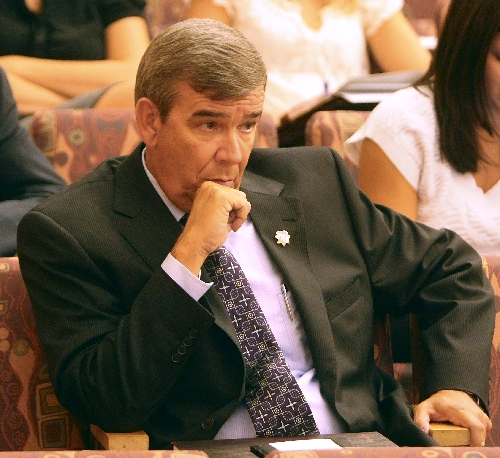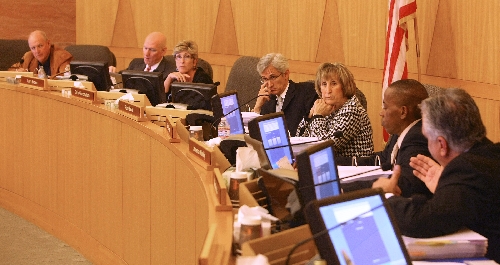County commission panel to study inquest process
Clark County commissioners Tuesday established a nine-member committee to examine the county's often-criticized coroner's inquest process for police-involved deaths.
The committee will have 45 days to study any aspects of the inquest process, including the contentious issue of whether a representative of the family should be allowed to cross-examine witnesses, before making its recommendations to the commission.
The effort is aimed at fixing a system that has been criticized by the advocates and the public for being one-sided.
"The thing that we need is fairness," Commission Chairman Rory Reid said.
Commissioner Steve Sisolak recommended the committee look at some specific issues he would like changed, such as requiring post-incident drug testing for police officers; ending the practice of having jurors declare if the shooting was justifiable, excusable or criminal; and allowing representatives of the family to participate in the pre-inquest hearing, which now is closed to them.
"I think we'll definitely see some changes," Sisolak said after the commission unanimously approved committee formation. "How substantive they will be will be up to the committee."
Two members of the group were named Tuesday: Christopher Blakesley, a UNLV Boyd School of Law professor who will chair the committee, and retired state Supreme Court Justice Bill Maupin. Each of the following groups also will nominate a representative to serve on the committee: the Las Vegas Metropolitan Police Department, American Civil Liberties Union of Nevada, National Association for the Advancement of Colored People, Las Vegas Police Protective Association, Clark County coroner's office, Clark County district attorney's office and Clark County public defender's office.
Clark County Sheriff Doug Gillespie said after the meeting he would serve on the committee on the department's behalf. Maggie McLetchie, staff attorney for the ACLU of Nevada, said she will represent her organization.
Committee meetings have yet to be scheduled. Commissioners said the meetings will be open to the public and public comment will be taken. They expect the committee to complete work by mid-November, and for the commission to take up the issue by Dec. 7.
Commissioners hope the strict deadline will head off issues that rose four years ago, when the commission convened a similar panel to look at overhauling the inquest process. That panel met for more than a year, during which time the panel members changed. The process was slow, but led to a revamp that included allowing the family to submit questions to the judge in writing.
The new committee will be taking up the same issues, said Gary Peck, who served on the first panel as then-executive director of the ACLU of Nevada.
He no longer works with the organization and will not serve on the new committee.
"It was evident from the first day the committee met what the sticking point was going to be," Peck said of the last effort. "And the sticking point was whether a representative of the family will be permitted to ask questions."
He said "all the rest of it will be window dressing," if the new effort does not result in more family involvement.
The issue is a critical one for the Las Vegas Police Protective Association, the Metropolitan Police Department's largest union. President Chris Collins called it a "deal-breaker" and said the union would recommend that its officers not testify during such an inquest. Officers always have testified during inquests.
Gillespie wouldn't say how he feels about the commissioners' proposed changes but said he welcomed their decision to form a committee to look at changes.
Commissioner Chris Giunchigliani wanted the panel to look at having a representative of the state attorney general, rather than the Clark County district attorney's office, handle the questioning during inquests. She also said the family of the deceased should be appointed an attorney if they can't afford one.
The coroner's inquest process, established in the 1960s to probe all civilian deaths at the hands of police officers, is written into Clark County code, and commissioners have the final say over the code. But some of the issues are not under the county's purview. Requiring after-incident drug and alcohol testing of officers, for example, would require a change in the contract between the department and its unions.
Talk of changes to the process has exploded in recent months following two controversial Las Vegas police shootings.
Trevon Cole, a 21-year-old father-to-be and small-time marijuana dealer, was killed during a mistake-riddled police raid on his home in June.
In July, Erik Scott, a 38-year-old West Point graduate, was shot and killed by three officers outside a Costco store in Summerlin. Inquest juries ruled both shootings justified.
Commissioners on Tuesday discussed doing away with jurors' verdicts, because the verdicts didn't match the "fact-finding" nature of the process. Sisolak said he didn't want to do away with juries because he felt they ask valuable questions of the witnesses.
Contact reporter Lawrence Mower at 383-0440 or lmower@reviewjournal.com


















